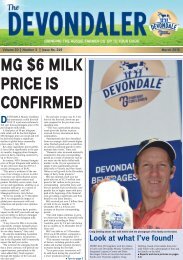You also want an ePaper? Increase the reach of your titles
YUMPU automatically turns print PDFs into web optimized ePapers that Google loves.
18<br />
JUNE <strong>2015</strong><br />
DEVONDALE MURRAY GOULBURN<br />
MG FarmC@re<br />
Trees, carbon offset values outlined<br />
By MARK JAGO<br />
FIFTEEN dairy farmers and<br />
Devondale Murray<br />
Goulburn More from Less<br />
project staff gained valuable<br />
insight into how trees can be<br />
used to their full advantage on<br />
farms.<br />
MG’s More From Less project<br />
organised a tour of Jigsaw Farms<br />
owned by Mark Wooton and Eve<br />
Kantor in south west Victoria.<br />
Jigsaw Farms is made up of<br />
two large land parcels totalling<br />
6700ha running a mixed grazing<br />
operation. A fine wool sheep<br />
flock, a prime lamb operation<br />
and a self-replacing beef herd<br />
make up the mixed grazing operation.<br />
The underlying focus of<br />
Jigsaw Farms is to integrate a<br />
profitable highly productive<br />
stock and agroforestry operation<br />
while adhering to environmental<br />
guidelines.<br />
This philosophy has led Mark<br />
and Eve to work on planting out<br />
many of the non-productive<br />
areas of the farm with either permanent<br />
plantings (55 per cent)<br />
or agroforestry plantations (45<br />
per cent of plantings, managed<br />
on a cycle of harvest and<br />
replanting).<br />
“Looking after the non-productive<br />
areas of the farm in this<br />
way has helped us gain efficiencies<br />
in production from the<br />
farm,” said Mark.<br />
Mark spoke passionately about<br />
the projects they have undertaken<br />
for carbon offsetting. The<br />
plantations on Jigsaw Farms<br />
cover include 1.2million trees<br />
that act as a carbon sink, taking<br />
in carbon dioxide from the<br />
atmosphere and storing carbon<br />
in the trees, also known as terrestrial<br />
sequestration.<br />
The farm expels less than or<br />
equivalent amounts of carbon<br />
<strong>Devondaler</strong> Murray Goulburn suppliers and Field Services Officers get ready for a visit to Jigsaw<br />
Farm in south west Victoria.<br />
Planting of trees<br />
is not seen as<br />
taking land from<br />
production, quite<br />
the opposite, as<br />
the evident lift in<br />
grazing production<br />
is attributed to the<br />
shelter provided<br />
by the trees.<br />
dioxide through its operations,<br />
especially through reduced use<br />
of fuel powered equipment<br />
which has enabled the farm to be<br />
carbon neutral.<br />
Planting of trees is not seen as<br />
taking land from production,<br />
quite the opposite, as the evident<br />
lift in grazing production is<br />
attributed to the shelter provided<br />
by the trees.<br />
Jigsaw Farms also participates<br />
in other carbon offset projects to<br />
continue to lower its environmental<br />
footprint.<br />
Water also plays an integral<br />
part on the farm.<br />
All waterways and creeks have<br />
been fenced off and revegetated,<br />
wetlands created and linked to<br />
other plantings to create biodiversity<br />
corridors.<br />
Bird surveys are completed<br />
every season and have been<br />
undertaken for many years and<br />
not only have bird numbers<br />
increased but so have the number<br />
of different species.<br />
“Climate change is an issue<br />
whether you believe it or not,”<br />
said Mark.<br />
“We have been able to demonstrate<br />
the reduction of the impact<br />
to our business through what we<br />
have done on farm.”<br />
Some of the benefits Jigsaw<br />
Farms sees from planting trees<br />
and protecting waterways are;<br />
● future income from wood<br />
products,<br />
● shelter for stock welfare and<br />
productivity,<br />
● shelter to lift winter pasture<br />
production,<br />
● contribution to climate change<br />
mitigation through CO2 capture,<br />
● habitat for wildlife and<br />
● prevention of nutrient build up<br />
in waterways.<br />
As a result the farming system<br />
is more resilient and adaptive.<br />
Methane, which comes from<br />
ruminant stock on farms and<br />
land fill, is a major contributor<br />
to greenhouse gases in the<br />
atmosphere.<br />
By finding ways to reduce<br />
methane levels expelled by ruminant<br />
stock there will be less contributing<br />
to atmospheric greenhouse<br />
gases.<br />
To address this issue, Jigsaw<br />
Farms has begun the process of<br />
improving the genetics of their<br />
animals so they are more efficient<br />
in converting feed to wool<br />
and meat.<br />
A number of positive outcomes<br />
are realised with<br />
improved reproductive rates<br />
resulting in increased lamb and<br />
calf numbers on the ground per<br />
breeding unit.<br />
On Jigsaw Farms, the fertilizer<br />
strategy aims to lift Olsen P levels<br />
to around 20+ resulting in<br />
the paddocks running at an average<br />
stocking rate of 18-20<br />
DSE(dry sheep equivalent) per<br />
ha, close to double the district<br />
average.<br />
This makes the business more<br />
profitable while decreasing the<br />
methane intensity from the business<br />
through increased productivity<br />
from the same area.<br />
MG, via the More from Less<br />
project, aims to assist its dairy<br />
farmer suppliers to investigate<br />
these same links between<br />
increased productivity and<br />
reduced greenhouse gas emissions.<br />
The visit to Jigsaw Farms,<br />
made possible by the More from<br />
Less project funding from the<br />
Australian Government, left the<br />
MG dairy farmers with a lot to<br />
digest.<br />
This included the observation<br />
that while Jigsaw Farms and<br />
their own dairy businesses were<br />
vastly different, there were<br />
many common issues and<br />
opportunities.<br />
Everyone who attended<br />
thought the visit was informative<br />
and worthwhile with some suggesting<br />
that one day was not<br />
long enough to take in all that<br />
Mark and Eve have achieved.<br />
MG suppliers wishing to learn<br />
more about increasing their productivity<br />
and lowering their<br />
environmental footprint can call<br />
their local FarmC@re facilitator<br />
through MG Field Services.<br />
New guide book launched to<br />
help minimise mastitis issues<br />
A NEW set of easy-to-use visual<br />
guides has been created by<br />
Dairy Australia’s (DA)<br />
Countdown 2020 team to help<br />
farmers minimise mastitis in<br />
the dairy.<br />
The wet winter months<br />
increase the risk of mastitis, a<br />
disease not only painful for the<br />
cow but damaging for milk<br />
quality, production and business<br />
profitability.<br />
The Countdown Shed Guides<br />
feature key aspects of the<br />
Countdown 2020 Farm<br />
Guidelines and clearly illustrate<br />
the steps required to prevent,<br />
monitor and treat mastitis<br />
through a pictorial format.<br />
Dairy Australia’s Program<br />
Development Manager, Erika<br />
Oakes, said the guide was tough,<br />
durable and a ‘must-have’ for<br />
the dairy.<br />
“The catalyst for this project<br />
is that we have had lots of<br />
feedback from farmers saying<br />
they wanted something they can<br />
refer to that is instructional<br />
and easy to understand,” she<br />
said.<br />
“For example, I often get calls<br />
from farmers asking how to<br />
mark cows, so now they will be<br />
able to hang this up in the shed<br />
and refer to it when they need.<br />
“While the Shed Guides will<br />
be useful for all staff milking<br />
cows it would also be a great<br />
document for training new<br />
staff,” Erika said.<br />
The new Countdown Shed<br />
Guides pack also includes a<br />
bonus high-quality milking<br />
apron and will be available free<br />
to all those undertaking Cups<br />
On Cups Off courses.<br />
Shed Guides packs, limited<br />
to two per farm, can also be<br />
ordered at www.dairyaustralia.<br />
com.au/shedguides.<br />
Coles backs business<br />
COLES will establish a<br />
Nurture Fund to help small<br />
Australian food and grocery<br />
producers, farmers and manufacturers<br />
to innovate and grow<br />
their business.<br />
Through the Coles Nurture<br />
Fund, Coles will allocate $50<br />
million over five years in grants<br />
and interest-free loans to fund<br />
the development of new market-leading<br />
products, technologies<br />
and processes.<br />
Coles Managing Director,<br />
John Durkan, said the fund<br />
would be open to businesses<br />
with less than $25 million in<br />
annual revenue and 50 or fewer<br />
full-time employees.<br />
“The Coles Nurture Fund is<br />
one way we can offer support<br />
and encouragement to small<br />
Australian businesses looking<br />
for assistance to take the<br />
next step in creating more<br />
productive and innovative<br />
ways of working,” Mr Durkan<br />
said.<br />
“Modest financial support<br />
can make the difference in<br />
getting great ideas up and<br />
running.” Small business<br />
entrepreneurs can submit<br />
requests for funds, along with<br />
their business plan, for review<br />
by the Coles Nurture Fund.<br />
Application forms for the<br />
Coles Nurture Fund are available<br />
at www.coles.com.au/nurturefund<br />
and applications<br />
should be submitted to nurturefund@coles.com.




